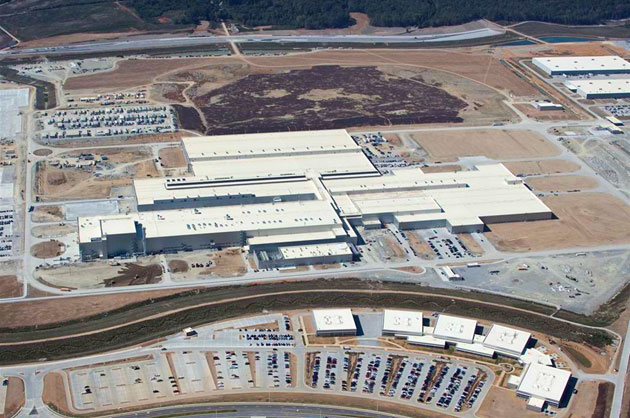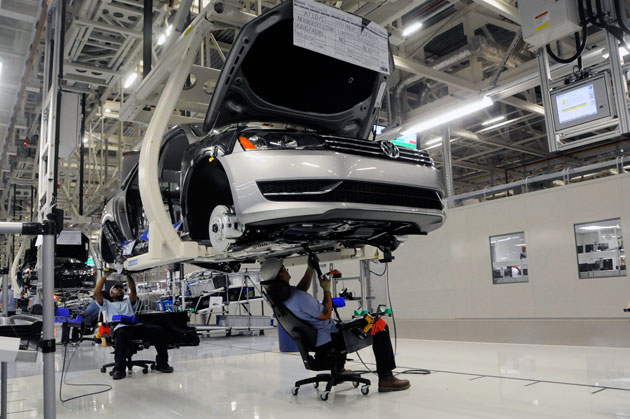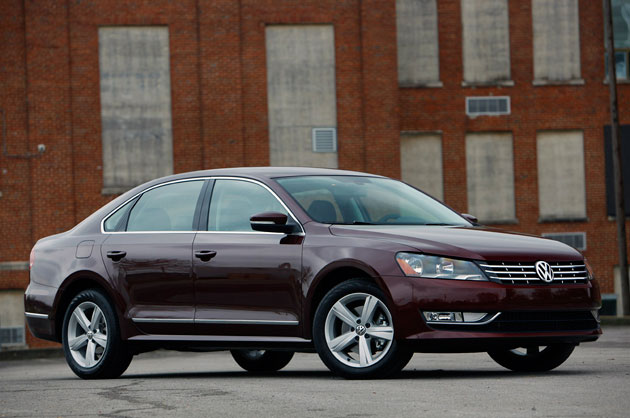When you're done, check out
Yet, as an example of how contrary this kind of thinking is to those who have understood the VW brand as all-premium all the time, a journo during the roundtable asked if quality of Chattanooga vehicles would be up to snuff – the unspoken question being whether VW would look closely after the quality of these less expensive vehicles. Klingler's answer was "It's a Volkswagen," and anything made in Tennessee has to meet Group standards.
The same journo followed that up with a question about "low-priced cars," at which point a slightly testy Klingler interrupted to say, "There is no low-priced car – we're just competitive in the segment. And why should it be different?"
Said Browing of the new Jetta, "The median price has gone up – we're selling more units above $19,000 than ever before, but it hasn't shifted the center of gravity [in the segment]. Look at the median price of the Jetta versus the Honda and Toyota – there's a $3,000 premium at the Jetta's median price."
Added Cervone, "We've doubled volume, transaction prices are better than the previous model, we had 90% better sales last month, and owner loyalty is up." March and April of this year were record-setting months for Jetta sales.
Jetta and Passat spearhead the sales push, but that doesn't mean the rest of the line-up will hop in the segment-penetration pool. When asked if VW planned to engineer offerings for the sweets spots of other U.S. segments, Browning answered, "What we're looking to do for our key car lines is make sure we're competing strongly in the core of their segments. With the Jetta and Passat being our two volume leaders, that gives us the pillars on which to build our business going forward. I don't think you necessarily roll that across all the vehicle lines – we're looking to selectively penetrate more deeply into certain segments in the U.S. market... As we grow the business it's very important that we go deeper, not just broader, into certain segments."
The intended takeway: there's still a VW for brand mavens, and at least when it comes to the Jetta and Passat, now there's one for almost everyone else, too.
COMING BACK TO THE U.S.
When we spoke to Krebs about the genesis of Strategy 2018, it was uncanny to hear him use the same kinds of terms that we heard from Jaguar's Global Brand Director Adrian Hallmark only a couple of months ago. Hallmark spoke of Jaguar having been a British brand that exported cars, but was now moving to be an international carmaker building vehicles tailored to specific markets.
Krebs said, "We used to create one car for the world. Now we need not one car for the world, we need plenty of cars for each market." He dates the change in the company attitude to about ten years ago, when VW began plotting factories around the world (it has built seven in the past five years). "From a more export-driven company we moved to a company that produces cars in their markets, and we make cars that have the flavor of the people in the market."

That seemed to be a guiding principle for the rest of the world and not for the U.S.; while VW was fortifying other outposts, its U.S. dominion suffered in all kinds of ways. Said Klingler, "The problem for a time was our focus on other regions – we haven't had the same focus on the U.S. over the past 15 years. We want to become very much more relevant to U.S. customers."
During those 15 years, the U.S. seemed to get cars that were what the Germans thought we should have, as opposed to what we wanted.
With the U.S. eclipsed as the world's number one market and still wobbling back up to its economic knees, the timing of VW's return could be seen as regrettable, but the market remains crucial.
Klingler's take was utterly professional: "America is for us an absolute target market. The U.S. market is competitive, very crowded, and we need to be present in the biggest markets."
Rainer Michel started off with the professional aspects, saying, "If we wanted to continue to grow this, we had to take care of the U.S. market – ten or eleven million cars is nothing anyone can ignore."

Eventually that turned personal: "When I'm in Germany I see importers and I think 'What are you doing just selling and making money here? If you want to make a difference you have to be a company in the area." He added, "The leadership, they take this personally – if we want to be a big player, we have to prove we can succeed around the world. The proof of what Dr. Winterkorn wants to do is in North America."
There is no need to fool ourselves, though – it is the profit motive and a euro worth almost $1.50 at the time of writing that underpins the enterprise. The company hasn't posted a profit in this market since 2002, making this an enormous investment in hope of gravy that it admits is still a couple of years away. "We believe in about 2013," said Klingler, "it will be possible to arrive at a profitable business case in the United States."
"You don't build a plant then walk away in two years," said Cervone. "The facility helps because 85 percent of the content is locally sourced. That gives us huge exchange rate protection, you can put content in the car that it deserves and you can protect pricing."

That mention of content is expected to make the plant pay off for U.S. buyers as well. Said Michel, "Production can be localized and at the right volume. From this we can create our own car line features that we can add to other lines, and then have cars for volume, SUVs, emotional cars and halo cars."
The cotter pin supporting the weight of the endeavor: the Passat. Said Klingler, "With the new engine plant in [Silao, Guanajuato] Mexico and with Puebla we have a big North American exposure. All is depending on the success of the Passat." And he appears to be optimistic, "We want to continue the success story we interrupted for a time."
Yet, as an example of how contrary this kind of thinking is to those who have understood the VW brand as all-premium all the time, a journo during the roundtable asked if quality of Chattanooga vehicles would be up to snuff – the unspoken question being whether VW would look closely after the quality of these less expensive vehicles. Klingler's answer was "It's a Volkswagen," and anything made in Tennessee has to meet Group standards.
The same journo followed that up with a question about "low-priced cars," at which point a slightly testy Klingler interrupted to say, "There is no low-priced car – we're just competitive in the segment. And why should it be different?"
We've doubled volume [of the Jetta], transaction prices are better than the previous model, we had 90% better sales last month, and owner loyalty is up.
Back to those drums, though, this is when the VW faithful start beating them, but perhaps to no avail: sales are the currency of this conversation, and based on that all VW has to do is point to the figures.Said Browing of the new Jetta, "The median price has gone up – we're selling more units above $19,000 than ever before, but it hasn't shifted the center of gravity [in the segment]. Look at the median price of the Jetta versus the Honda and Toyota – there's a $3,000 premium at the Jetta's median price."
Added Cervone, "We've doubled volume, transaction prices are better than the previous model, we had 90% better sales last month, and owner loyalty is up." March and April of this year were record-setting months for Jetta sales.
Jetta and Passat spearhead the sales push, but that doesn't mean the rest of the line-up will hop in the segment-penetration pool. When asked if VW planned to engineer offerings for the sweets spots of other U.S. segments, Browning answered, "What we're looking to do for our key car lines is make sure we're competing strongly in the core of their segments. With the Jetta and Passat being our two volume leaders, that gives us the pillars on which to build our business going forward. I don't think you necessarily roll that across all the vehicle lines – we're looking to selectively penetrate more deeply into certain segments in the U.S. market... As we grow the business it's very important that we go deeper, not just broader, into certain segments."
The intended takeway: there's still a VW for brand mavens, and at least when it comes to the Jetta and Passat, now there's one for almost everyone else, too.
COMING BACK TO THE U.S.
When we spoke to Krebs about the genesis of Strategy 2018, it was uncanny to hear him use the same kinds of terms that we heard from Jaguar's Global Brand Director Adrian Hallmark only a couple of months ago. Hallmark spoke of Jaguar having been a British brand that exported cars, but was now moving to be an international carmaker building vehicles tailored to specific markets.
Krebs said, "We used to create one car for the world. Now we need not one car for the world, we need plenty of cars for each market." He dates the change in the company attitude to about ten years ago, when VW began plotting factories around the world (it has built seven in the past five years). "From a more export-driven company we moved to a company that produces cars in their markets, and we make cars that have the flavor of the people in the market."

That seemed to be a guiding principle for the rest of the world and not for the U.S.; while VW was fortifying other outposts, its U.S. dominion suffered in all kinds of ways. Said Klingler, "The problem for a time was our focus on other regions – we haven't had the same focus on the U.S. over the past 15 years. We want to become very much more relevant to U.S. customers."
During those 15 years, the U.S. seemed to get cars that were what the Germans thought we should have, as opposed to what we wanted.
"The customer is right to say 'I can't buy your car because I can't put my cup in it.'"
Rainer Michel is the VP of product marketing and strategy-based in the States, he works with Germany to determine feature specs. "We cannot just ignore North America, and this is about respect for the North American market. Even with a thing like cupholders, the customer is right to say 'I can't buy your car because I can't put my cup in.'"With the U.S. eclipsed as the world's number one market and still wobbling back up to its economic knees, the timing of VW's return could be seen as regrettable, but the market remains crucial.
Klingler's take was utterly professional: "America is for us an absolute target market. The U.S. market is competitive, very crowded, and we need to be present in the biggest markets."
Rainer Michel started off with the professional aspects, saying, "If we wanted to continue to grow this, we had to take care of the U.S. market – ten or eleven million cars is nothing anyone can ignore."

Eventually that turned personal: "When I'm in Germany I see importers and I think 'What are you doing just selling and making money here? If you want to make a difference you have to be a company in the area." He added, "The leadership, they take this personally – if we want to be a big player, we have to prove we can succeed around the world. The proof of what Dr. Winterkorn wants to do is in North America."
There is no need to fool ourselves, though – it is the profit motive and a euro worth almost $1.50 at the time of writing that underpins the enterprise. The company hasn't posted a profit in this market since 2002, making this an enormous investment in hope of gravy that it admits is still a couple of years away. "We believe in about 2013," said Klingler, "it will be possible to arrive at a profitable business case in the United States."
"You don't build a plant then walk away in two years," said Cervone. "The facility helps because 85 percent of the content is locally sourced. That gives us huge exchange rate protection, you can put content in the car that it deserves and you can protect pricing."

That mention of content is expected to make the plant pay off for U.S. buyers as well. Said Michel, "Production can be localized and at the right volume. From this we can create our own car line features that we can add to other lines, and then have cars for volume, SUVs, emotional cars and halo cars."
The cotter pin supporting the weight of the endeavor: the Passat. Said Klingler, "With the new engine plant in [Silao, Guanajuato] Mexico and with Puebla we have a big North American exposure. All is depending on the success of the Passat." And he appears to be optimistic, "We want to continue the success story we interrupted for a time."

Sign in to post
Please sign in to leave a comment.
Continue